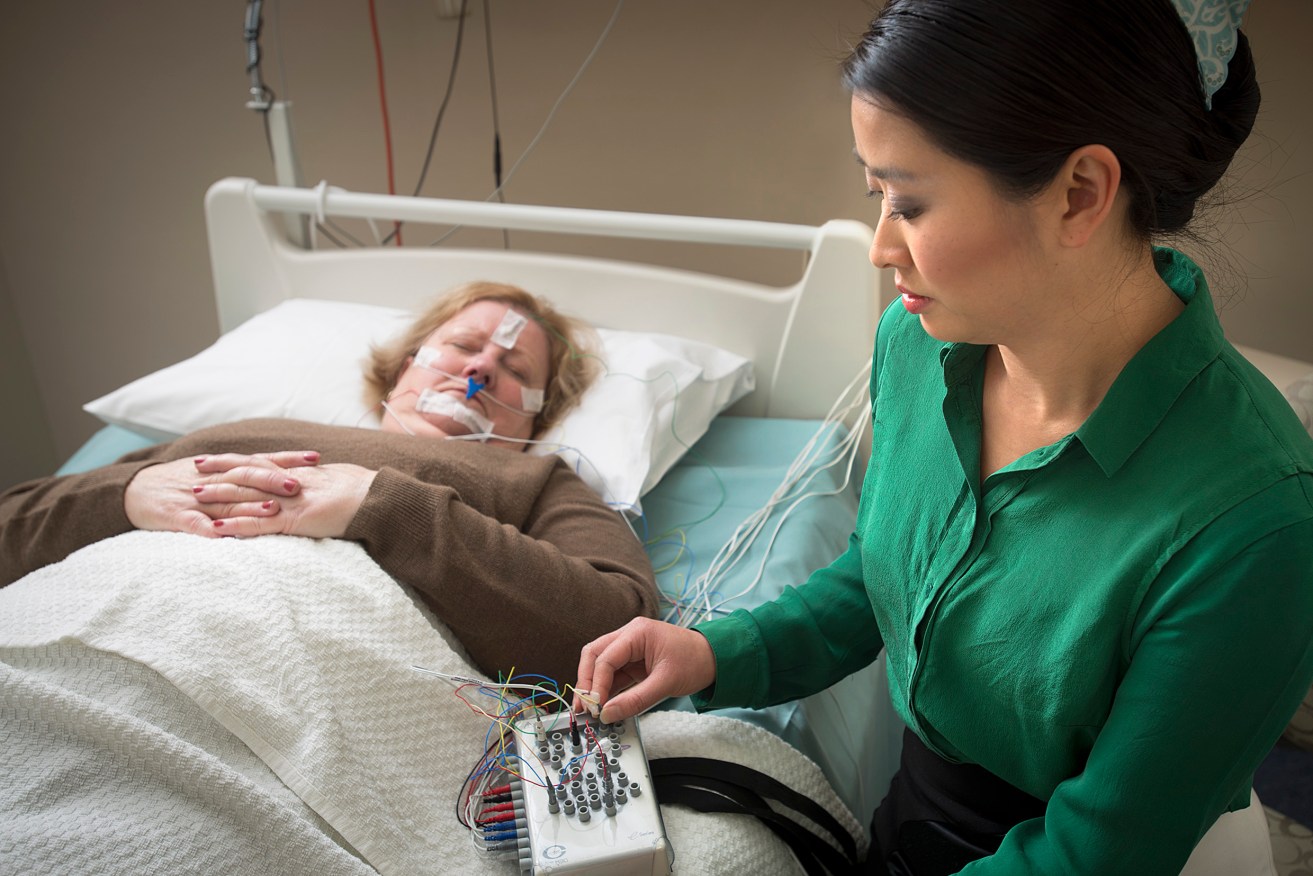
Quest to put sleep disorders to rest
Sleep disorders have a negative impact on the health and productivity of Australians, but a new Adelaide-based research centre is bringing together a network of experts to tackle the problem.

Dr Ching Li Chai-Coetzer, from the Adelaide Institute for Sleep Health, testing a patient for sleep apnoea. The new Flinders Centre of Research Excellence is looking for more simplified sleep study testing.
The cost to the Australian economy of the two most common disorders – obstructive sleep apnoea (OSA) and insomnia – is well over $30 billion per year.
Now, a major new $2.5 million National Health and Medical Research Council grant project will draw in new and old techniques to more efficiently manage in primary care sleep health problems which are increasing health care costs around the world.
Led by Flinders University, the National Centre for Sleep Health Services Research aims to position primary care systems at the centre of sleep health management.
Chief investigator Professor Douglas McEvoy says current health practices and policy fail to cost-effectively manage these common sleep disorders, with an over-reliance on sleep apnoea tests which are too complex and costly, poor treatment selection and access to primary care, and unregulated industry practices which often fail to deliver good outcomes for sleep-deprived patients.
“This five-year NHMRC project will bring together expertise from the Adelaide Institute for Sleep Health, primary health specialists and health services researchers to redesign, test and reorganise health-care practices to better manage sleep problems both in Australia and internationally,” Professor McEvoy says.
“The Centre of Research Excellence (CRE) focus will be on simplified, cost-effective, evidence-based methods for diagnosing and managing sleep problems in primary care, with primary care practitioners better connected and supported with specialist sleep services in a ‘hub and spoke’ model.
“These new methods will extend the reach and effectiveness of primary-care service delivery and be cost-neutral or cost-saving to the health system.”
A wealth of background research at Flinders University will be leveraged into the new CRE, including:
- A new wearable device to cure insomnia, developed and commercialised at Flinders based on research by global sleep expert Emeritus Professor Leon Lack;
- New techniques to treat OSA and reduce accidents and ill health;
- Clinical trials led by Dr Ching Li Chai-Coetzer, Dr Andrew Vakulin and Professor Peter Catcheside showing the benefits of nurse and GP-led OSA management
- Research at the Alertness Cooperative Research Centre (CRC).
The new SA sleep research centre will show how GPs and primary care can be placed at the centre of sleep disorders service delivery.
“Sleep disorders and sleep restriction linked to our modern lifestyle and other factors are affecting sleep and the physical and mental health of civilians in every country of the world,” says Professor McEvoy, who was a keynote speaker at the ESRS World Sleep Congress 2017 in Prague this month.
Along with Professor McEvoy and Professor Lack and Dr Vakulin, CRE associate investigators at Flinders include Associate Professor Billingsley Kaambwa, Professor Karen Reynolds, Dr Kerry Hancock, Professor Mark Mackay, Dr Nicole Lovato, Professor Peter Catcheside, Professor Richard Reed and Associate Professor Sutapa Mukherjee
Other investigators are Professor Nigel Stocks and Professor Bob Adams (University of Adelaide), Professor Nicholas Zwar (University of Wollongong), Professor Ron Grunstein and Dr Christopher Gordon (University of Sydney), Professor Sally Redman (the Sax Institute) and Professor Steven Wesselingh (director, South Australian Health and Medical Research Institute).
The CRE will be part of the NHMRC South Australian Advanced Health and Research Translational Centre and will partner with industry, Philips Health Care, the Alertness CRC, and not-for-profit organisations the Australasian Sleep Association and Sleep Health Foundation to bring about strategic changes needed to more cost effectively manage sleep health problems and their adverse outcomes in the community.
The National Centre for Sleep Health Services Research brings together an extensive network of internationally recognised experts in sleep and respiratory medicine/research, general practice, nursing, pharmacy, health services and policy research, epidemiology, health economics and sleep health technologies.
The National Sleep Health Services Research Centre of Excellence will be officially launched at a forum at Flinders at Victoria Square on Wednesday, November 1. The Symposium on Sleep Health Services Research will feature key CRE research leaders and presentations by guest speakers Professor Dorothy Bruck, President of the Sleep Health Foundation; NHMRC Postdoctoral Research Fellow Dr Ching Li Chai-Croetzer; Professor Paddy Phillips, Chief Medical Officer, SA Health; Professor Terry Young, HealthCare Systems at Brunel University, London; and Professor Ferran Barbe, from the Hospital Universitari Arnau de Vilanova, Spain.




